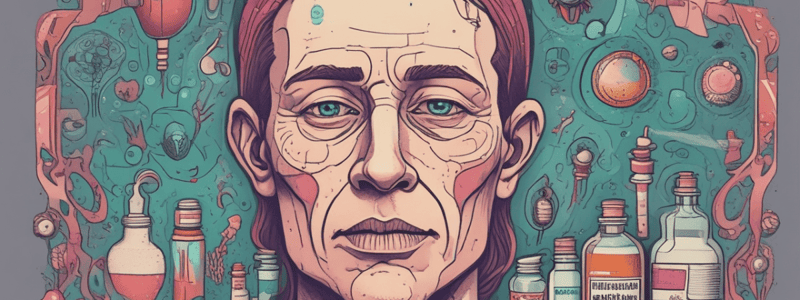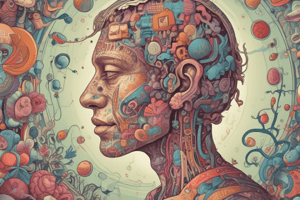Podcast
Questions and Answers
What is the primary characteristic that distinguishes psychotic disorders from affective disorders?
What is the primary characteristic that distinguishes psychotic disorders from affective disorders?
- Emotional disturbances in mood
- Disorganized thinking and emotional abnormalities
- Presence of hallucinations and delusions
- Gross disturbances in comprehension of reality (correct)
Which of the following antidepressants is a monoamine oxidase inhibitor (MAOI)?
Which of the following antidepressants is a monoamine oxidase inhibitor (MAOI)?
- Amitriptyline
- Venlafaxine
- Fluoxetine
- Phenelzine (correct)
What is the primary mechanism of action of antipsychotic drugs in alleviating symptoms of schizophrenia?
What is the primary mechanism of action of antipsychotic drugs in alleviating symptoms of schizophrenia?
- Blocking both dopamine and serotonin receptors (correct)
- Stimulating the release of dopamine and serotonin
- Blocking dopamine receptors
- Blocking serotonin receptors
Which of the following is a common side effect of antipsychotic medications?
Which of the following is a common side effect of antipsychotic medications?
What is the estimated prevalence of schizophrenia in the world's population?
What is the estimated prevalence of schizophrenia in the world's population?
Which of the following types of antidepressants is bupropion an example of?
Which of the following types of antidepressants is bupropion an example of?
What is the term for the irregular, jerky movements that can occur as a side effect of long-term antipsychotic use?
What is the term for the irregular, jerky movements that can occur as a side effect of long-term antipsychotic use?
Which of the following CNS stimulants is commonly used to treat attention deficit hyperactivity disorder (ADHD)?
Which of the following CNS stimulants is commonly used to treat attention deficit hyperactivity disorder (ADHD)?
What is the initial effect of antipsychotic drugs on dopamine neurotransmission?
What is the initial effect of antipsychotic drugs on dopamine neurotransmission?
What is the long-term effect of antipsychotic drugs on dopamine receptor activity?
What is the long-term effect of antipsychotic drugs on dopamine receptor activity?
What is the characteristic of neuroleptic malignant syndrome (NMS)?
What is the characteristic of neuroleptic malignant syndrome (NMS)?
What is the mechanism of action of typical antipsychotics?
What is the mechanism of action of typical antipsychotics?
What is the time frame for positive symptoms to subside with typical antipsychotics?
What is the time frame for positive symptoms to subside with typical antipsychotics?
What is the effect of continued blockade of dopamine receptors on dopaminergic neurons?
What is the effect of continued blockade of dopamine receptors on dopaminergic neurons?
What is the treatment for neuroleptic malignant syndrome (NMS)?
What is the treatment for neuroleptic malignant syndrome (NMS)?
What is the consequence of dopamine receptor up-regulation and supersensitivity to dopamine agonists?
What is the consequence of dopamine receptor up-regulation and supersensitivity to dopamine agonists?
What is a common adverse effect of antipsychotics like fluphenazine and haloperidol?
What is a common adverse effect of antipsychotics like fluphenazine and haloperidol?
What is a unique feature of olanzapine?
What is a unique feature of olanzapine?
Which atypical antipsychotic is a partial dopamine agonist at dopamine and 5-HT1A receptors?
Which atypical antipsychotic is a partial dopamine agonist at dopamine and 5-HT1A receptors?
What is a possible use of haloperidol beyond treating psychosis?
What is a possible use of haloperidol beyond treating psychosis?
What is a common behavioral change seen after administration of antipsychotics?
What is a common behavioral change seen after administration of antipsychotics?
Which of the following is a side effect of fluphenazine, but not of olanzapine?
Which of the following is a side effect of fluphenazine, but not of olanzapine?
What is a unique use of aripiprazole?
What is a unique use of aripiprazole?
What is a possible preparation of fluphenazine and haloperidol?
What is a possible preparation of fluphenazine and haloperidol?
Which of the following is NOT a characteristic of manic episodes?
Which of the following is NOT a characteristic of manic episodes?
What is the primary mechanism of tricyclic antidepressants (TCAs)?
What is the primary mechanism of tricyclic antidepressants (TCAs)?
Which of the following antidepressants is a tertiary amine?
Which of the following antidepressants is a tertiary amine?
What is the potential consequence of taking tricyclic antidepressants excessively?
What is the potential consequence of taking tricyclic antidepressants excessively?
Which of the following conditions is NOT a common indication for selective serotonin reuptake inhibitors (SSRIs)?
Which of the following conditions is NOT a common indication for selective serotonin reuptake inhibitors (SSRIs)?
What is the effect of tricyclic antidepressants on norepinephrine and serotonin levels?
What is the effect of tricyclic antidepressants on norepinephrine and serotonin levels?
Which of the following is a secondary amine?
Which of the following is a secondary amine?
What is the benefit of using newer selective serotonin reuptake inhibitors (SSRIs) over tricyclic antidepressants (TCAs)?
What is the benefit of using newer selective serotonin reuptake inhibitors (SSRIs) over tricyclic antidepressants (TCAs)?
What is a characteristic that distinguishes SSRIs from TCAs?
What is a characteristic that distinguishes SSRIs from TCAs?
Which of the following antidepressants is NOT an SSRI?
Which of the following antidepressants is NOT an SSRI?
What is an advantage of SSRIs over TCAs?
What is an advantage of SSRIs over TCAs?
Which of the following is a common side effect of SSRIs?
Which of the following is a common side effect of SSRIs?
What type of receptors do SNRIs NOT interact with?
What type of receptors do SNRIs NOT interact with?
When are MAOIs typically used in treating depression?
When are MAOIs typically used in treating depression?
What is a potential concern with MAOIs?
What is a potential concern with MAOIs?
What is a unique characteristic of SSRIs compared to other antidepressants?
What is a unique characteristic of SSRIs compared to other antidepressants?
Flashcards are hidden until you start studying
Study Notes
Psychotherapeutic Drugs
- Antipsychotics: Types include typical antipsychotics (e.g., haloperidol aka Haldol) and atypical antipsychotics (e.g., clozapine aka Clozaril)
- Antidepressants: Types include tricyclic antidepressants (TCAs) (e.g., amitriptyline aka Elavil), selective serotonin reuptake inhibitors (SSRIs) (e.g., fluoxetine aka Prozac), serotonin and norepi reuptake inhibitors (SNRIs) (e.g., venlafaxine aka Effexor), monoamine oxidase inhibitors (MAOIs) (e.g., phenelzine aka Nardil), and other antidepressants (e.g., bupropion aka Wellbutrin)
- Mood Stabilizers: Examples include lithium aka Lithobid
- CNS Stimulants: Examples include methylphenidate aka Ritalin
Overview of Major Psychiatric Disorders
- Psychoses: Gross disturbances in comprehension of reality, characterized by hallucinations (false perceptions) and delusions (false beliefs)
- Affective Disorders: Emotional disturbances in which mood is low (depression) or high (mania)
- Types: Include schizophrenia, bipolar disorder, and depression
Schizophrenia
- Most common form of psychosis: Affects approximately 1% of the world's population
- Hallmark symptoms: Delusions, hallucinations, disorganized thinking, and emotional abnormalities
- Forms: Paranoid, disorganized, catatonic forms, and others
Extrapyramidal Symptoms (EPS)
- Drug-induced movement disorders: Acute and tardive symptoms, including dystonia, akathisia, Parkinsonism, and tardive dyskinesia
- Symptoms: Involuntary muscle contractions, restlessness, rigidity, bradykinesia, tremor, and irregular jerky movements
Pharmacologic Effects of Antipsychotics
- Blocking dopamine and serotonin receptors: Alleviates symptoms of schizophrenia, but the mechanism is not fully understood
- Receptors are blocked immediately: But the drug takes a few weeks to improve symptoms
- Dopamine neurotransmission: Antipsychotic drugs produce 3 time-dependent changes in dopamine neurotransmission, including increased dopamine synthesis, release, and metabolism, followed by compensatory response, inactivation of dopaminergic neurons, and eventually dopamine receptor up-regulation and supersensitivity
Neuroleptic Malignant Syndrome (NMS)
- Severe form of drug toxicity: Occurs in 0.5 to 1% of patients treated with antipsychotics, resembles malignant hyperthermia
- Life-threatening: Characterized by muscle rigidity, elevated temperature, autonomic dysfunction, and altered mental status
- Managed by: Immediately discontinuing treatment and administering dantrolene to prevent further muscular abnormalities
Typical Antipsychotics
- Examples: Chlorpromazine aka Thorazine, Fluphenazine aka Prolixin, Thioridazine, Haloperidol aka Haldol
- Mechanism: Exert therapeutic effect as a result of D2 receptor antagonism
- Positive symptoms: Usually subside in 1 to 3 weeks, including agitation, auditory hallucinations, grandiose or paranoid delusions, and improved sleep and eating patterns
- Adverse effects: Akathisia, pseudoparkinsonism, and dystonia
Atypical Antipsychotics
- Examples: Clozapine aka Clozaril, Olanzapine aka Zyprexa, Quetiapine aka Seroquel, Risperidone aka Risperdal, Aripiprazole aka Abilify
- Properties: Similar to typical antipsychotics but with fewer autonomic side effects and more EPS
- Olanzapine: Chemical analogue of clozapine, has similar properties but with fewer autonomic side effects and does not cause agranulocytosis
- Aripiprazole: Differs slightly, partial dopamine agonist at dopamine and 5-HT1A receptors but antagonizes 5-HT2A receptors
Affective Disorders
- Bipolar Disorder: Manic phase characterized by elevated mood, inflated self-esteem, increased talking, racing thoughts, and decreased need for sleep
- Antidepressant drugs: Used to treat depression, including tricyclic antidepressants (TCAs), selective serotonin reuptake inhibitors (SSRIs), serotonin and norepi reuptake inhibitors (SNRIs), and monoamine oxidase inhibitors (MAOIs)
Tricyclic Antidepressants (TCAs)
- Examples: Amitriptyline aka Elavil, Clomipramine aka Clofranil, Desipramine, Imipramine aka Tofranil, Nortriptyline aka Pamelor
- Mechanism: Block neuronal reuptake of norepi and serotonin by blocking norepi transporter (NET) and serotonin transporter (SERT)
- Adverse effects: High incidence of adverse effects, can cause severe toxicity when taken excessively
Selective Serotonin Reuptake Inhibitors (SSRIs)
- Examples: Fluoxetine aka Prozac, Fluvoxamine aka Luvox, Paroxetine aka Paxil, Sertraline aka Zoloft, Citalopram aka Celexa, Escitalopram aka Lexapro
- Mechanism: As effective as TCAs but cause fewer autonomic side effects and less sedation
- Adverse effects: Produce fewer sedative, autonomic, and CV side effects than TCAs, may cause nervousness, dizziness, and insomnia
Serotonin and Norepi Reuptake Inhibitors (SNRIs)
- Examples: Venlafaxine aka Effexor, Desvenlafaxine aka Prestique, Duloxetine aka Cymbalta
- Mechanism: Selective for both serotonin and norepi reuptake transporters, unlike older TCAs, they don't interact with other receptor types to produce adverse effects
- Adverse effects: Fewer autonomic, sedative, and CV side effects than TCAs
Studying That Suits You
Use AI to generate personalized quizzes and flashcards to suit your learning preferences.




